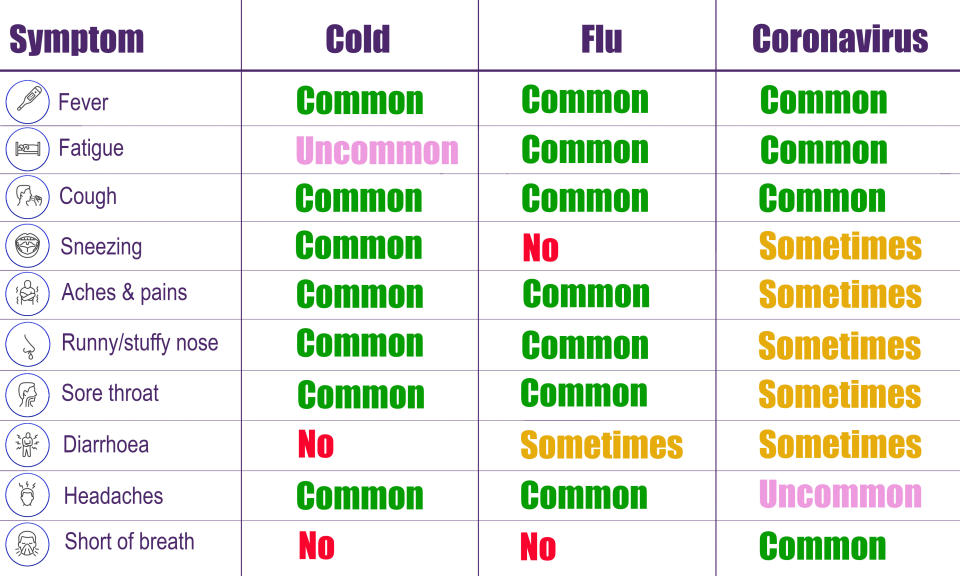Coronavirus may spread in faeces: Scientists give six tips on how to keep pipes pathogen-free

Scientists have put together a set of tips that could stop the coronavirus spreading in at-home plumbing systems.
Virtually unheard of at the start of the year, the new pathogen strain is somewhat mysterious.
It mainly spreads face-to-face via infected droplets that are expelled when a patient coughs or sneezes, hence the importance of social distancing.
Early research suggest the infection is mild in four out of five cases, however, it can trigger a respiratory disease called COVID-19.
There is also evidence traces of the virus may be shed in faeces.
To help combat this, a team from Heriot-Watt University in Edinburgh are advising the public to run their taps twice a day and not ignore any foul smells coming from their bathroom.

The coronavirus is thought to have emerged at a seafood and live animal market in the Chinese city Wuhan at the end of last year.
It has since spread into more than 180 countries across every inhabited continent.
Latest coronavirus news, updates and advice
Live: Follow all the latest updates from the UK and around the world
Fact-checker: The number of COVID-19 cases in your local area
Explained: Symptoms, latest advice and how it compares to the flu
Since the outbreak was identified, more than one million cases have been confirmed, of whom over 212,000 have “recovered”, according to Johns Hopkins University.
Incidences have been plateauing in China since the end of February, and the US and Europe are now the worst-hit areas.
The UK has had more than 34,100 confirmed cases and over 2,900 deaths.
Globally, the death toll has exceeded 53,100.
Coronavirus: Does it spread in faeces?
Fears the coronavirus may spread via faecal matter arose in mid-February when two people living 10 floors apart in the same Hong Kong apartment block were diagnosed.
Officials later found an unsealed pipe in one of the patient’s bathroom, which could have allowed the virus into her flat.
The coronavirus is one of seven strains of a virus class that are known to infect humans.
Others trigger the common cold, while one leads to severe acute respiratory syndrome (Sars), which killed 774 people during its 2002/3 outbreak.
The new coronavirus is said to be more genetically similar to Sars than any other strain of that class.
In 2003, 342 people were diagnosed with Sars, of whom 42 died, in a 50-storey apartment block in Hong Kong.
The World Health Organization concluded “inadequate plumbing” was a “likely contributor”.
“Virus rich excreta” was thought to have “re-entered residents’ apartments” via “sewage and drainage systems where there were strong upward air flows, inadequate ‘traps’ and non-functional water seals”.
While the coronavirus may shed in human waste, some experts have questioned whether these traces are infectious.
“It isn’t a very pleasant thought, but every time you swallow, you swallow mucus from your upper respiratory tract,” said Dr John Edmunds from the London School of Hygiene & Tropical Medicine.
“This sweeps viruses and bacteria down into our gut, where they are denatured in the acid conditions of our stomach.
“With modern, very highly sensitive detection mechanisms we can detect these viruses in faeces.
“Usually, viruses we can detect in this way are not infectious to others, as they have been destroyed by our guts.”
Unlike with Sars, diarrhoea is not a common symptom of the new coronavirus, suggesting human waste is not a main route of transmission.

Coronavirus: Expert tips to keep plumbing systems pathogen-free
The extent to which the coronavirus spreads in human waste is up for debate.
In order to keep case numbers down and relieve pressure on health services, the Heriot-Watt scientists stress all routes of transmission should be considered.
“By its very design, the wastewater plumbing system is a harbinger of pathogenic microorganisms”, the team wrote in The Lancet Global Health.
To keep plumbing systems virus-free, they stress people should:
Not ignore foul smells coming from a bathroom, kitchen or washing area
Ensure all water appliances in kitchens and bathrooms are fitted with a functioning U-bend. “U-bends act as a protective barrier between us and the sewer system,” said lead author Dr Michael Gormley. “When they have no water there is a greater risk of air, contaminated with pathogen-laden aerosols, entering a room. Water traps can lose their water for a number of reasons such as system over-use, which causes pressure surges and can compromise the integrity of the system.”
Prevent U-bends losing their water-trap seal by running all taps for up to 10 seconds at least twice a day
Immediately seal any disconnected or open wastewater pipes. This can be done by covering the end of the pipe with an elastic rubber glover or securing a plastic bag over the end with some tape. Ensure the bag has no holes
Seal any cracks or leaks in a pipe with tape or glue
“Continuously monitor [the] whole system performance” in large or tall buildings. Self-isolation may mean “infected people contribute to a higher viral load in the [plumbing] system”. This is a particular concern in “high-risk transmission settings such as hospitals and health-care buildings”

What is the coronavirus?
The coronavirus tends to cause flu-like symptoms, including fever, cough and slight breathlessness.
In severe incidences, pneumonia may come about if the infection spreads to the air sacs in the lungs, causing them to become inflamed and filled with fluid or pus.
The lungs then struggle to draw in air, resulting in reduced oxygen in the bloodstream and a build-up of carbon dioxide.
The coronavirus has no “set” treatment, with most patients naturally fighting off the infection.
Those requiring hospitalisation are offered “supportive care”, like ventilation, while their immune system gets to work.
As well as coughs, sneezes and human waste, there is also evidence the coronavirus can survive on surfaces.
Officials urge people ward off the coronavirus by washing their hands regularly and maintaining social distancing.
To stem the spread of infection, Boris Johnson has introduced draconian measures that only allow Britons to leave their home for “very limited purposes”, like shopping for essentials.
Anyone with the coronavirus’ tell-tale fever or cough has been told to self-isolate entirely for seven days, while all other members of their household must do the same for two weeks.




